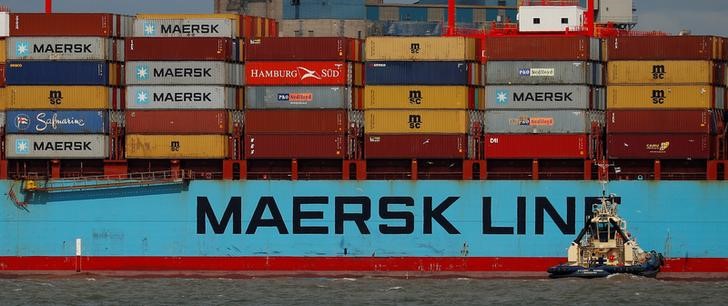U.S. stock futures slip lower; Cook’s firing increases Fed independence worries
Investing.com -- Barclays (LON:BARC) analysts in a note dated Friday have expressed a bearish outlook on AP Moller Maersk (CSE:MAERSKb), citing downside risks to the shipping giant’s stock as the container shipping industry faces persistent headwinds.
The bank maintains an “underweight” rating on Maersk shares, signaling expectations of underperformance relative to the broader market, with a revised price target of DKK 9,600, still well below the current trading level of DKK 12,065 as of February 12.
The primary concern raised by Barclays is the imbalance in supply and demand within the container shipping industry, which the analysts believe will persist into 2026.
While Maersk has projected a peak in vessel deliveries for 2024 and 2025, Barclays points to data from Clarksons suggesting that new ship deliveries will continue growing at a rate of 7% in 2025, slowing slightly to 4-5% in 2026 before picking up again in 2027.
The analysts warn that this influx of new capacity, combined with an eventual reopening of Red Sea shipping lanes, could tip the market back into oversupply, driving freight rates down to levels seen in late 2023 or even 2019.
Compounding these concerns, Barclays remains skeptical about Maersk’s capacity management strategies.
While slow steaming—reducing vessel speeds to curb supply growth—is expected to be the first response to falling freight rates, the analysts flag its limited ability to absorb excess capacity.
Scrapping of older vessels, another potential remedy, has historically been low in the industry, and Barclays does not expect environmental regulations to alter this dynamic in the near term. As a result, the bank foresees continued downward pressure on rates and earnings.
Barclays also casts doubt on the sustainability of Maersk’s shareholder buyback program. The company recently announced a $2 billion share buyback plan for 2025, reflecting management’s confidence in the long-term industry outlook.
However, Barclays notes that Maersk’s free cash flow is expected to turn negative, with a projected cash burn of approximately $2.9 billion in 2025 and $2.5 billion annually in the mid-term.
With the company’s net cash position forecasted to approach zero by the end of 2025, analysts question whether Maersk can maintain such capital returns without compromising financial stability.
Despite these warnings, Barclays acknowledges that Maersk’s management remains more optimistic about the industry’s future.
The company is placing a greater focus on its logistics and integrated supply chain business, potentially diversifying its revenue streams beyond traditional ocean freight.
Nonetheless, Barclays argues that the market is currently overestimating Maersk’s long-term earnings potential, particularly given the likelihood of a prolonged period of weaker freight rates and negative free cash flow.
While Maersk’s stock has seen strong gains over the past year, the report suggests that these levels may not be sustainable.
Barclays’ revised valuation implies a potential downside of over 20%, reinforcing its cautious stance on the stock.
Unless industry fundamentals improve or Maersk demonstrates stronger-than-expected resilience, the investment bank sees limited upside in the company’s shares moving forward.
